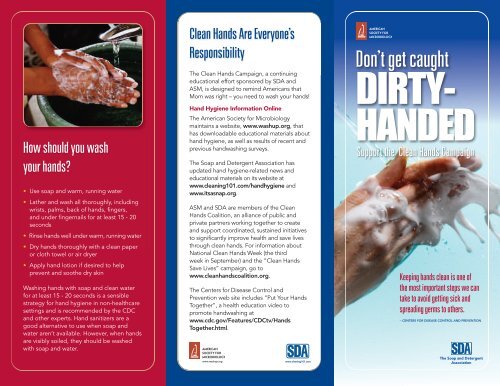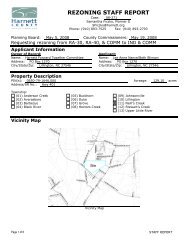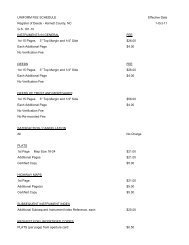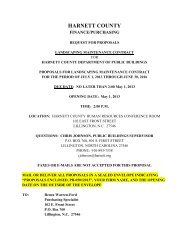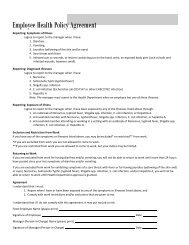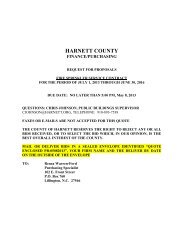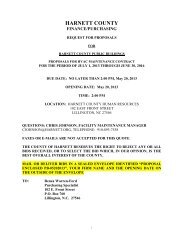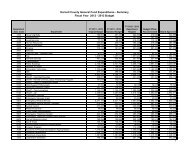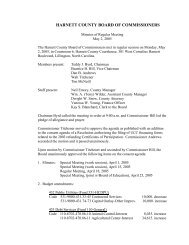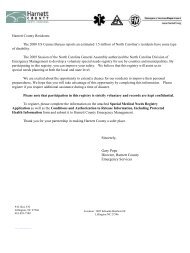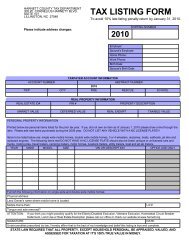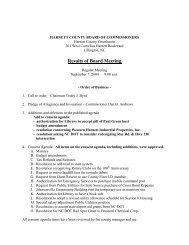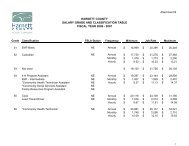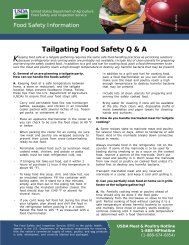Handwashing Brochure
Handwashing Brochure
Handwashing Brochure
You also want an ePaper? Increase the reach of your titles
YUMPU automatically turns print PDFs into web optimized ePapers that Google loves.
How should you wash<br />
your hands<br />
• Use soap and warm, running water<br />
• Lather and wash all thoroughly, including<br />
wrists, palms, back of hands, fingers,<br />
and under fingernails for at least 15 - 20<br />
seconds<br />
• Rinse hands well under warm, running water<br />
• Dry hands thoroughly with a clean paper<br />
or cloth towel or air dryer<br />
• Apply hand lotion if desired to help<br />
prevent and soothe dry skin<br />
Washing hands with soap and clean water<br />
for at least 15 - 20 seconds is a sensible<br />
strategy for hand hygiene in non-healthcare<br />
settings and is recommended by the CDC<br />
and other experts. Hand sanitizers are a<br />
good alternative to use when soap and<br />
water aren’t available. However, when hands<br />
are visibly soiled, they should be washed<br />
with soap and water.<br />
Clean Hands Are Everyone’s<br />
Responsibility<br />
The Clean Hands Campaign, a continuing<br />
educational effort sponsored by SDA and<br />
ASM, is designed to remind Americans that<br />
Mom was right – you need to wash your hands!<br />
Hand Hygiene Information Online<br />
The American Society for Microbiology<br />
maintains a website, www.washup.org, that<br />
has downloadable educational materials about<br />
hand hygiene, as well as results of recent and<br />
previous handwashing surveys.<br />
The Soap and Detergent Association has<br />
updated hand hygiene-related news and<br />
educational materials on its website at<br />
www.cleaning101.com/handhygiene and<br />
www.itsasnap.org.<br />
ASM and SDA are members of the Clean<br />
Hands Coalition, an alliance of public and<br />
private partners working together to create<br />
and support coordinated, sustained initiatives<br />
to significantly improve health and save lives<br />
through clean hands. For information about<br />
National Clean Hands Week (the third<br />
week in September) and the “Clean Hands<br />
Save Lives” campaign, go to<br />
www.cleanhandscoalition.org.<br />
The Centers for Disease Control and<br />
Prevention web site includes “Put Your Hands<br />
Together”, a health education video to<br />
promote handwashing at<br />
www.cdc.gov/Features/CDCtv/Hands<br />
Together.html.<br />
Don’t get caught<br />
DIRTY-<br />
HANDED<br />
Support the Clean Hands Campaign<br />
Keeping hands clean is one of<br />
the most important steps we can<br />
take to avoid getting sick and<br />
spreading germs to others.<br />
-- CENTERS FOR DISEASE CONTROL AND PREVENTION<br />
www.washup.org<br />
www.cleaning101.com<br />
The Soap and Detergent<br />
Association
Frequent and proper hand<br />
hygiene can stop germs and<br />
illness in their tracks.<br />
Many cases of colds, flu, and foodborne<br />
illness are spread by unclean hands, and<br />
these diseases are responsible for billions of<br />
dollars each year in health care expenditures<br />
and productivity losses in the United States.<br />
Worldwide, infectious diseases remain the<br />
leading cause of illness and death and the<br />
third-leading cause of death in the United<br />
States. Good hand hygiene will also reduce<br />
the risk of spreading germs that have<br />
become resistant to antibiotics, such as<br />
methicillin-resistant Staphylococcus aureus,<br />
or MRSA. Some viruses and bacteria can live<br />
two hours or longer on surfaces like tables,<br />
doorknobs, and telephones. These diseasecausing<br />
germs can enter your body when<br />
your unwashed hands touch your nose,<br />
mouth, eyes, or open wounds. Simple<br />
handwashing with soap and water can in<br />
some cases reduce infections by more than<br />
50 percent. 1<br />
1<br />
Didier Pittet, “Clean hands reduce the burden of disease,” The<br />
Lancet, www.thelancet.com, Vol. 366, July 16 2005, pgs 185 – 187.<br />
When it comes to washing their<br />
hands, Americans say they are<br />
getting the message, but their<br />
actions speak otherwise.<br />
Although nine out of ten (92%) Americans in a<br />
telephone survey said they always washed<br />
their hands after using a public restroom, an<br />
observational survey in four cities found the<br />
actual number to be more like 3 out of 4<br />
(77%). That’s down nearly 10% from a similar<br />
study done in 2005, and men are mostly<br />
responsible for the decline. Overall, the<br />
percentage of women observed washing their<br />
hands was down only slightly from 90% in<br />
2005 to 88% in 2007.<br />
Americans’ self-reported hygiene behavior in<br />
2007 remains consistent with what past<br />
surveys show. Among 1,001 men and<br />
women interviewed via telephone in 2007,<br />
92 percent said they always wash their hands<br />
after going to a public restroom and 86<br />
percent said they do likewise after using the<br />
bathroom in the home. In 2005, those figures<br />
were 91 percent and 83 percent, respectively.<br />
Survey Methodology<br />
Harris Interactive ® conducted telephone and observational studies on<br />
behalf of the American Society for Microbiology and The Soap and<br />
Detergent Association in August 2007. Telephone surveys were<br />
conducted with 1,001 respondents. Results were weighted for age by<br />
gender, race/ethnicity, region, household size, and education where<br />
necessary to align them with their actual proportions in the population.<br />
They observed the behavior of 6,076 adults (of whom 3,065 were men<br />
and 3,011 were women, who appeared to be age 18 and older) in public<br />
restrooms located at major public attractions in the U.S., and recorded<br />
whether or not they washed their hands after using the facilities. The<br />
research was conducted in four cities and at six different locations:<br />
Atlanta – Turner Field; Chicago – Museum of Science and Industry and<br />
Shedd Aquarium; New York City – Penn Station and Grand Central<br />
Station; and San Francisco – Ferry Terminal Farmers Market.<br />
When should you wash<br />
your hands<br />
• After using the restroom<br />
• Before, during, and after<br />
preparing food, especially<br />
raw meat, poultry, or<br />
seafood<br />
• Before and after meals and<br />
snacks<br />
• Before inserting or removing<br />
contact lenses<br />
• After touching animals or<br />
handling animal waste<br />
• After changing a diaper<br />
• Before and after caring for<br />
someone who is sick or<br />
injured<br />
• After blowing your nose,<br />
coughing, or sneezing<br />
• More frequently when you<br />
or someone in your home is<br />
sick<br />
• Anytime<br />
your hands<br />
are dirty


